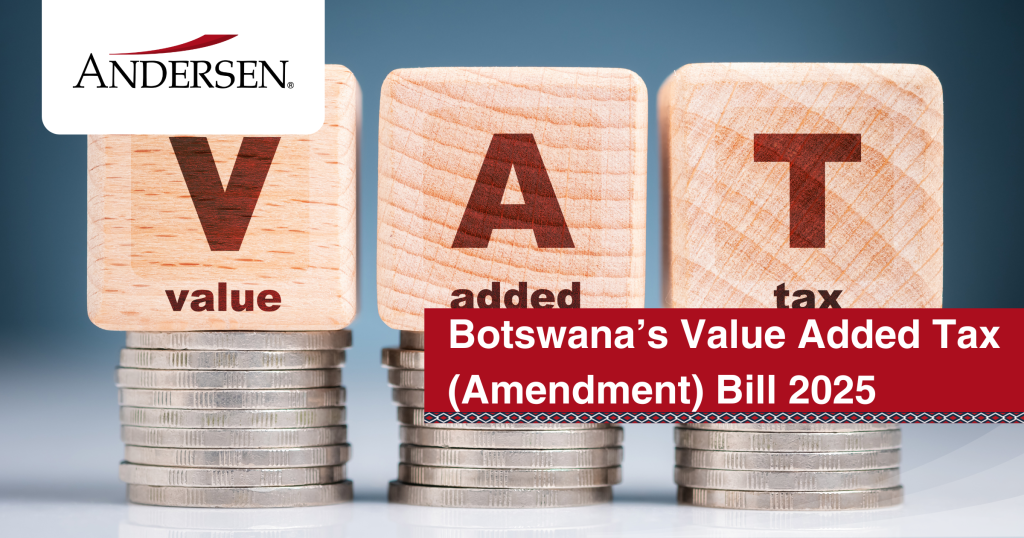The Value Added Tax (Amendment) Bill 2025 marks a turning point in Botswana’s indirect tax system. The Bill seeks to align the country’s VAT framework with the realities of a global digital economy by introducing taxation on remote services and mandating electronic fiscal devices. These reforms reflect Botswana’s commitment to transparency, revenue integrity, and international compliance standards.
Overview
Since the introduction of VAT in 2002, Botswana’s commercial environment has transformed significantly. Digital commerce, online platforms, and cross-border electronic transactions have become integral to business operations and consumer behaviour. The existing VAT Act, designed primarily for physical goods and services, required modernisation to address this new economic reality.
The 2025 Amendment Bill therefore introduces two principal reforms:
- The taxation of remote services supplied from outside Botswana to persons within Botswana.
- The mandatory adoption of electronic fiscal devices for VAT-registered entities.
Taxation of Remote Services
The Bill defines remote services as those delivered electronically where the supplier and recipient have no physical connection during the performance of the service. This definition encompasses online subscriptions, software downloads, cloud computing, data storage, streaming services, and other digital content.
To determine whether VAT applies, the Bill introduces a set of location indicators. These include the customer’s internet protocol address, geo-location data, billing address, bank account details, or SIM card country code. The Commissioner General may also rely on any other reliable data to establish the recipient’s location. When at least two of these indicators identify Botswana as the place of consumption, the service becomes subject to VAT at the standard rate of 14 percent.
Collection Mechanism and Reverse Charge
The Bill differentiates between individual consumers and VAT-registered entities. For unregistered consumers, foreign suppliers must collect VAT on the sale of digital services and remit it to the Botswana Unified Revenue Service (BURS). For VAT-registered businesses or large unregistered entities, a reverse charge mechanism applies.
Under this system, the customer self-assesses the VAT due and declares it as both output and input tax in the same VAT return. For example, if a Botswana company acquires cloud storage services valued at P10 000 from a foreign supplier, the company must calculate 14 percent VAT (P1 400) as output tax. If the service supports taxable business operations, it may also claim P1 400 as input tax, creating a neutral VAT position. Individual consumers, who cannot recover VAT, effectively bear the full cost.
This approach ensures equity between domestic and foreign suppliers and reinforces the destination principle of VAT, where tax applies in the country of consumption.
Registration and Compliance by Foreign Suppliers
A non-resident supplier of remote services must register for VAT in Botswana if the total value of taxable supplies reaches or exceeds P500 000 within twelve months. Such suppliers must appoint a VAT representative resident in Botswana who is responsible for compliance, filing, and correspondence with BURS. The representative bears personal liability for any unpaid VAT.
Foreign suppliers may, with approval from the Commissioner General, file and pay VAT in foreign currency such as United States Dollars, Euros, or British Pounds. Alternatively, they may convert the value of supplies into Pula using the official exchange rate applicable at the close of the tax period. Once an election is made, it must remain in force for at least one year unless BURS approves a change.
Filing, Reporting, and Record-Keeping Obligations
The Amendment Bill strengthens administrative and record-keeping obligations for all VAT-registered persons. Registered entities must retain complete accounting records, fiscal receipts, tax invoices, and supporting documentation for a minimum of seven years. Records may be kept electronically and, with approval, may be stored outside Botswana provided that they are accessible to BURS upon request.
Filing frequency will vary. Government departments and large unregistered entities will file VAT returns every two months. Foreign suppliers of remote services will submit quarterly returns. Adjustments to correct underpayments or overpayments may be made in subsequent returns, subject to the Commissioner General’s consent.
These provisions ensure accurate reporting and enable BURS to maintain a consistent audit trail for all taxable transactions.
Electronic Fiscal Devices and Digital Invoicing
The introduction of electronic fiscal devices represents a significant advancement in Botswana’s digital compliance strategy. All VAT-registered businesses will be required to issue receipts through approved devices that transmit data directly to BURS. This ensures real-time reporting and enhances transparency.
Failure to use an authorised device without reasonable cause will incur a penalty of P10 000 per month. More serious offences, such as device tampering or issuing false receipts, carry penalties of up to P100 000 or imprisonment for up to two years. These sanctions underscore the government’s commitment to integrity in VAT administration and the reduction of revenue leakages.
Legislative Process and Implementation
The Value Added Tax (Amendment) Bill 2025 remains under consideration by the National Assembly. It will only become law once enacted and assented to by the President. The Botswana Unified Revenue Service has commenced stakeholder consultations, engaging businesses, professional bodies, and digital service providers to prepare for a smooth implementation. As of this publication, no commencement date has been declared.
Conclusion
The Value Added Tax (Amendment) Bill 2025 represents a decisive step towards modernising Botswana’s VAT system and aligning it with international taxation standards. By addressing the treatment of remote services and introducing digital invoicing technology, the Bill strengthens the fairness and efficiency of VAT administration.
Businesses operating within Botswana should begin evaluating their systems to ensure readiness for electronic fiscal device integration. Foreign digital service providers must assess whether their turnover thresholds require VAT registration and review the implications of the reverse charge mechanism for their clients.
At Andersen in Botswana, we remain committed to supporting both domestic and international clients in understanding and preparing for these forthcoming reforms. Our tax specialists continue to monitor legislative developments and can provide tailored guidance once the Bill becomes law.

by Nomsa Manele
Section RIC – Tax


[…] Andersen […]